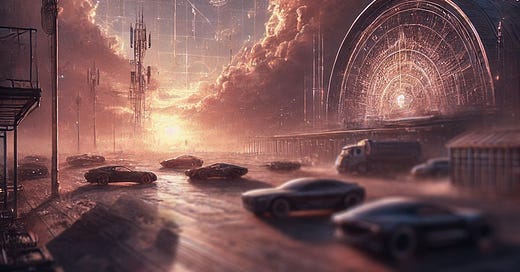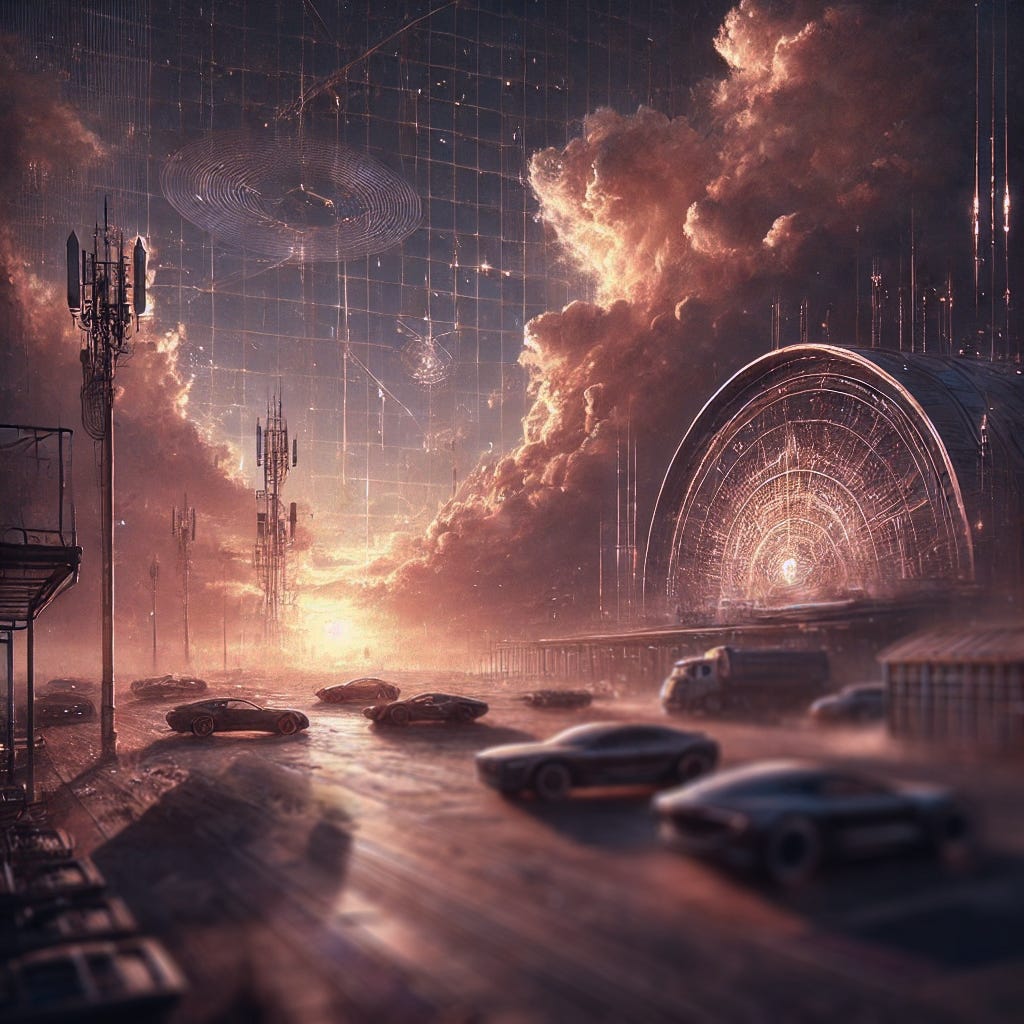A rumor spread among the teens who congregated behind the Golden Apple cafeteria after school: rub an inflated balloon over your hair by the back wall of the restaurant, and your head will explode.
The Golden Apple quickly posted online, “Don’t do this.”
By then, some forty kids had used drug store balloons to empty their skulls onto the restaurant’s wall. The exploded kids appeared at their homes alive, shuddering and shaken, their attitudes suddenly indescribably shitty. Some didn’t recover. Three of the kids blew from the inside-out, meaning no more meaningful contact with anyone. The Golden Apple closed for forensics, but DNA searches of the wall confirmed nothing. Still, word of the miracle spread.
Coming so close on the heels of the nearby Aventura Outlet Mall bombing, it increased business. One morning in the Golden Apple’s parking lot, two hundred car windshields fired back against the sun rising opposite the Rockies. It was 11:35 a.m., January 25th, 2045. The elderly would soon arrive for lunch. I sat in my car in the parking lot, floating on pain pills and tuning my antique four band radio. At the time, I ran a one-person ad house for eastern New Mexico’s media from my car. I ate tuna subs with every digital designer who was still hanging in out here.
I needed pain meds more now, seven days after the bombing in the Bag & Baggage. In the recovery room, after they’d removed most of the plate glass from my back, leaving only the pieces so small they could be called dust, or elementary particles of glass, they said to me, “You’ll be all right.”
The elderly already neared twenty milling about, held up at the entrance to the Golden Apple by a man connected to an oxygen tank who was negotiating with two men over who would hold the door for the women.
That’s the excitement in Dayton, New Mexico, other than kids claiming to have exploded, disappeared, and resurrected, and the Bag & Baggage walloping in an eardrum-piercing explosive shock. When the T-4 winds and mega storms migrated east years ago, the tornado chasers followed. I stayed behind to tune between stations from this parking lot.
Radio sounds, the wattage of words and music, travel in waves of invisible light down an aluminum tube as dead disc jockeys spin sad songs from the echoing band and deliver their farewell transmissions. Signing off on our last broadcast day. Their ancient words famously ribbon and wave through interstellar space, inspiring the belief that we might one day be heard by something out there.
I tuned—never turned—the dial, but more radio stations dropped out of existence by the week, replaced by a high-pitched squawk. Once, I thought I heard a DJ yell, “Can you hear me?” It was a scream.
In that thick, continuous band of voices and music that used to run together when you tuned—something like those satellite images of glowing webs of light connecting East Coast cities—in all of that, a rot had started opening holes through which something new came. A noise, some music, but altered, and not right in the original sense. Those ancient transmissions bounced off the icy bodies in the Andromeda galaxy and came back to us garbled. Whether they’d decayed or were corrupted by stellar dust, no one knew. The AIs listened but made nothing of the noise.
From my car, I watched an aging cowboy plug four quarters into the last surviving newspaper dispenser in front of the cafeteria and pull out three copies of USA Today. Sunlight illuminated the man a dying gold. His straw hat glowed a dirty yellow. A red Western shirt strained across his belly, and a blue, faded tattoo spread over one of his hairy forearms, the remnant of some ancient enthusiasm.
With the stolen newspapers tucked under his arm, he crossed to a brown-and-white Winnebago, tiny matching curtains behind its dirty windows. When he opened the driver’s door, the sound of a sermon wafted out. He climbed inside.
Dayton supported a truckers’ lending library. Spiritual audiobooks left by drivers making their drops could be picked up at any truck stop. I still had “In the Time of Our Lord: #8,” a sermon on what the world would look like if God had not sent Jesus. We’d be pagans standing around in Jerusalem surrounded by animals to sacrifice. Totally futile. We would gather things and use things and eat, but we would be living only to survive. Belief provides a life in this universe that nothing else can. Do you close your restaurant just because children used your parking lot to blow their heads into abstract splatters against your outdoor walls, but then re-appeared at home as little monsters? Not if you have a healthy, older clientele. If their friends posted photos of the wall and tagged them on the internet? I’d say you should just wait till you know the patterns better, which is what I set out to do.
I laid the Styrofoam box containing my lunch on the passenger seat and started my car. I popped another of my father’s pain pills and followed the Winnebago onto the freeway.
The radio had lost the weather station. The disappeared channel left behind a breathy groan. My little four-band radio didn’t get better reception than my car’s, but I settled for listening to the news through its moon-shot static.
A ten-year-old boy and a toddler girl watched me from the wide rear window of the Winnebago. The boy executed a series of foreign vulgarities. His gestures were clear and well-rehearsed. The flicking of his fingers around his elbows and chin and skinny armpits were moves he must have learned online. I showed him the most popular finger in this country. The boy disappeared from the window, leaving the girl alone. She tapped her doll’s forehead against the glass.
As my car emerged from beneath an overpass, a staticky station tuned itself in. The artificial DJ announced: It’s twelve forty-five, Tuesday, January twenty-fifth. Fifty-five now, forty-eight degrees expected for the overnight low. The Number Four Lane is closed today. Exit Ten, Eleven and Eleven-B are closed until the twenty-fifth. Praise Him today, tomorrow, always. Now let’s get it on with the top one-hundred countdown through the Thirties.
It’s so easy to concentrate on these pills. Thank you, modern-day shamans, for bringing them to us. I was free to pursue the cowboy down a stretch of four-lane highway I could drive blindfolded. I had work to do all over, signatures to stamp, tax data to copy in-person, biometrics to gather now that all the passwords had been cracked.
The Winnebago took the Aventura Outlet Mall off-ramp. I followed him to a parking space a hundred yards from the east entrance, far from the other cars. I parked two empty rows away. Long streaks of golden cloud cover stretched over the parking lot, brushing my hands resting on the steering wheel a dusty bronze.
I watched as the old cowboy got out of the Winnebago carrying the newspapers. He knelt in an empty parking space to spread the newspaper sheets over the asphalt in a semi-circle around himself. The boy of the vulgar gestures came around the other side of the Winnebago carrying a hunter-orange cooler. The cowboy opened the cooler and pulled out a long, pink fish. He reached for his belt, drew a slim knife and sliced open the fish. Glistening innards fell from the fish onto the newspaper. The boy passed the man another fish, and the cowboy returned to him sliced flaps of the ones he had cleaned. The little girl watched from the rear window.
I didn’t see any difference in where I was. Places remained places, parking lots were just parking lots, but I’d started to see what was happening, living here. It was clearer among the cars and the shoppers moving to and from the mall and the Golden Apple and the Payless. Nothing was at home anymore. The lots in front of the stores, familiar as a friend, had become like strangers. The sun seemed to set before it was natural. I was certain I wasn’t the only one who couldn’t get their radio to work.
The man and the boy gathered the cleaned fish and the cooler and climbed back into the Winnebago, leaving the guts and newspapers behind. I waited until they were out of sight, then got out of my car and approached the parking space.
A splay of sacks and pouches and long bloody strands lay scattered across USA Today ten-day weather forecasts. There was an article about the kids whose heads exploded against the Golden Apple, calling our town’s belief in the miracle “news of the weird.”
Then came a tightness in my lungs, some internal static, a closing in of the body and the sky. It was the old feeling of a panic attack rising, so I did my breathing in the nose and out the mouth. There must have been something off with my biorhythms, or we were too close to the winter solstice, or maybe it was just a touch of hypoglycemia. It didn’t work, however, blaming my thinking on spacy science or low sunlight and blood sugar levels.
I took a video of the fish guts, panning across them, then took my dad’s pain pills from my coin pocket and dry-swallowed two more.
The idea of a future would dissolve soon. The future would funnel out of everyone’s minds and then people wouldn’t recognize the changes unless they were driving a visitor around town, telling them, “That store is new…and that’s new… and that used to be a field,” the most alienating of observations.
Can you hear me?
Parking lots weren’t the same anymore. When I sat in them, trying to find a station, I felt something like static in my hair. Soon my life would break open, and the fracture wouldn’t come from fish-gut divination, but invisible light waves splitting the clouds in space.
This chapter is part of The Lot, the first volume of SUM FLUX. Featured in Edition 3—the culmination of Volume 1—this work is one of eight contributions to this edition. Read more about this zine and its theme here:






Really enjoyed these images, the golden light, the last handful of radio stations & cowboy with his fish in the empty parking lots in contrast to the futuristic setting (that we're only told about in this chapter)... there's something timeless in the protagonist's confused drifting.
Looking forward to reading more!